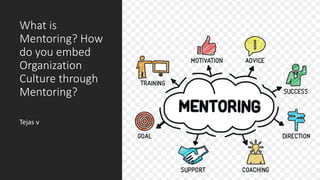
What is mentoring
- 1. What is Mentoring? How do you embed Organization Culture through Mentoring? Tejas v
- 2. What is mentoring • Mentoring is a system of semi-structured guidance whereby one person shares their knowledge, skills and experience to assist others to progress in their own lives and careers. Mentors need to be readily accessible and prepared to offer help as the need arises - within agreed bounds. What's in it for us? • As mentee Being able to change/achieve your goals more quickly and effectively than working alone Building a network of expertise to draw on can benefit both yourself and others • As mentor Mentoring is voluntary but extremely rewarding, and can benefit your own skills development and career progression You need to be the sort of person who wants others to succeed, and have or can develop the skills needed to support them
- 3. What makes a good mentor • Willingness to share skills, knowledge, and expertise. • Demonstrates a positive attitude and acts as a positive role model. • Takes a personal interest in the mentoring relationship. • Exhibits enthusiasm in the field. • Values ongoing learning and growth in the field. • Provides guidance and constructive feedback. • Motivates others by setting a good example.
- 4. How to embed mentoring in organisation culture • Make Mentoring Part of Agenda To meet the mentoring goal it is essential to incorporate the same in the organization's training and development agenda. “The training platform should be able to support the mentoring culture by enabling the skill trainings and providing relevant educational opportunities,” • Make personal goal-setting a priority Setting personal and team goals consistently is a huge driver of high performance across teams. Before we even have a first touch with a candidate, we introduce this concept in the way we market our open roles.
- 5. How to embed mentoring in organisation culture • Embrace direct feedback across the entire organization When cultivating the next generation of leaders, it’s important to empower them to speak up and use their voice. Core to someone’s ability to grow and improve is knowing how to give and receive feedback. Leadership needs to provide direction and guidance that’s not only pointed and direct, but demonstrates that they deeply care and want to help. • Scale access to leadership Leadership is core to company success, not only for business outcomes but people outcomes too. Leaders provide the vision and experience that inspire people to do their best work and live the company mission
- 6. Conclusion Companies benefit from mentoring programs because they contribute to the development of a better-trained and engaged workforce. Mentors help mentees learn the ropes at a company, develop relationships across the organization, and identify skills that should be developed or improved upon.
Notes de l'éditeur
- Mentors very often have their own mentors, and in turn their mentees might wish to ‘put something back’ and become mentors themselves - it's a chain for ‘passing on’ good practice so that the benefits can be widely spread. Mentoring can be a short-term arrangement until the original reason for the partnership is fulfilled (or ceases), or it can last many years. Mentoring is more than ‘giving advice’, or passing on what your experience was in a particular area or situation. It's about motivating and empowering the other person to identify their own issues and goals, and helping them to find ways of resolving or reaching them - not by doing it for them, or expecting them to ‘do it the way I did it’, but by understanding and respecting different ways of working. Mentoring is not counselling or therapy - though the mentor may help the mentee to access more specialized avenues of help if it becomes apparent that this would be the best way forward.
- A good mentor is willing to teach what he/she knows and accept the mentee where they currently are in their professional development. A good mentor exhibits the personal attributes it takes to be successful in the field. By showing the mentee what it takes to be productive and successful Good mentors do not take their responsibility as a mentor lightly. They feel invested in the success of the mentee. Enthusiasm is catching and new employees want to feel as if their job has meaning and the potential to create a good life. illustrate how the field is growing and changing and that even after many years there are still new things to learn. Anyone that feels stagnant in their current position will not make a good mentor. guidance and constructive feedback to their mentee. This is where the mentee will most likely grow the most by identifying their current strengths and weaknesses and learning how to use these to make themselves successful in the field